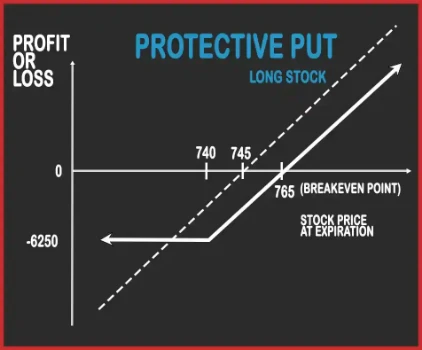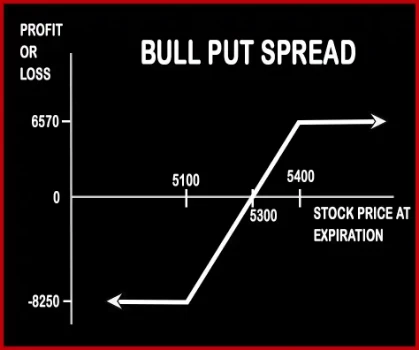Compare Strategies
| PROTECTIVE PUT | BULL PUT SPREAD | |
|---|---|---|

|

|
|
| About Strategy |
Protective Put Option StrategyProtective Put Strategy is a hedging strategy where trader guards himself from the downside risk. This strategy is adopted when a trader is long on the underlying asset but skeptical of the downside. He will buy one ATM Put Option to hedge his position. Now, if the underlying asset moves either up or down, the trader is in a safe position.
|
Bull Put Spread Option StrategyBull Put Spread option trading strategy is used by a trader who is bullish in nature and expects the underlying asset to move in an upward trend in the near future. This strategy includes buying of an ‘Out of the Money’ Put Option and selling of ‘In the Money’ Put Option of the same underlying asset and the same expiration date. When you write a Put, you will receive prem .. |
PROTECTIVE PUT Vs BULL PUT SPREAD - Details
| PROTECTIVE PUT | BULL PUT SPREAD | |
|---|---|---|
| Market View | Bullish | Bullish |
| Type (CE/PE) | PE (Put Option) | PE (Put Option) |
| Number Of Positions | 1 | 2 |
| Strategy Level | Beginners | Advance |
| Reward Profile | Unlimited | Limited |
| Risk Profile | Limited | Limited |
| Breakeven Point | Purchase Price of Underlying + Premium Paid | Strike price of short put - net premium paid |
PROTECTIVE PUT Vs BULL PUT SPREAD - When & How to use ?
| PROTECTIVE PUT | BULL PUT SPREAD | |
|---|---|---|
| Market View | Bullish | Bullish |
| When to use? | This strategy is adopted when a trader is long on the underlying asset but skeptical of the downside. | Bull Put Spread strategy is used when you're of the view that the price of a particular underlying will rise, move sideways, or marginally fall. |
| Action | Buy 1 ATM Put | Buy OTM Put Option, Sell ITM Put Option |
| Breakeven Point | Purchase Price of Underlying + Premium Paid | Strike price of short put - net premium paid |
PROTECTIVE PUT Vs BULL PUT SPREAD - Risk & Reward
| PROTECTIVE PUT | BULL PUT SPREAD | |
|---|---|---|
| Maximum Profit Scenario | Price of Underlying - Purchase Price of Underlying - Premium Paid | Max Profit = Net Premium Received |
| Maximum Loss Scenario | Premium Paid + Purchase Price of Underlying - Put Strike + Commissions Paid | Max Loss = (Strike Price Put 1 - Strike Price of Put 2) - Net Premium Received |
| Risk | Limited | Limited |
| Reward | Unlimited | Limited |
PROTECTIVE PUT Vs BULL PUT SPREAD - Strategy Pros & Cons
| PROTECTIVE PUT | BULL PUT SPREAD | |
|---|---|---|
| Similar Strategies | Long Call, Call Backspread | Bull Call Spread, Bear Put Spread, Collar |
| Disadvantage | • Value of protective put position decreases as time passes • Holding period of the protective put can be affected by the timing as a result tax rate on the profit or loss from the stock can be affected. | • Limited profit potential. • In loss situations, time decay may go against you. |
| Advantages | • Unlimited potential profit due to indefinitely rise in the underlying stock price . • This strategy allows you to hold on to your stocks while insuring against losses. • Hedging strategy, trader can guard himself from the downside risk. | • Benefit from the time decay in profit positions but harmful in loss positions. • Profitable when underlying stock price rises, move sideways or marginal drop. • Reduce the downside risk. |